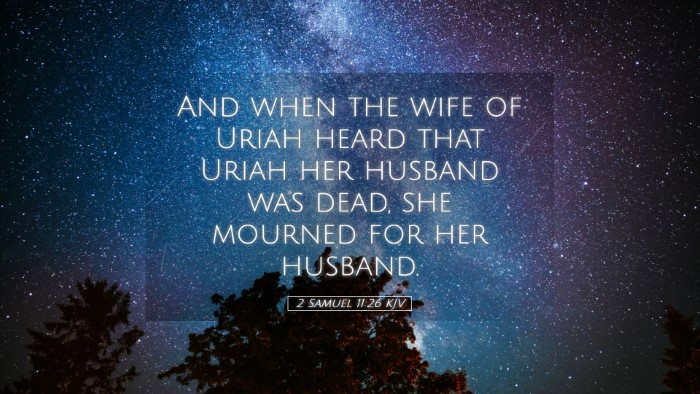Commentary on 2 Samuel 11:26
Bible Verse: "When the wife of Uriah heard that Uriah her husband was dead, she mourned for her husband."
Introduction
This verse, nestled in the narrative of David's grievous sin with Bathsheba, highlights the complexity of human emotions and the tragic consequences of sin. Here, we witness the sorrow of Bathsheba upon learning of her husband's death, which adds a profound layer to the unfolding drama. In this commentary, we draw insights from several public domain sources to elucidate the theological, ethical, and emotional dimensions of this passage.
The Context of 2 Samuel 11
The chapter narrates David's descent into sin, beginning with his lust for Bathsheba, leading to adultery and ultimately the orchestrated death of her husband, Uriah. The events reflect a critical juncture in David's life, showcasing how even the most revered of saints can fall into grievous sin.
Historical Context
Matthew Henry notes the significance of this tragedy within the historical framework of Israel's monarchy. David, as the king, had a responsibility not just for his actions but also for the moral state of his kingdom. His adultery and the subsequent murder of Uriah showcase a departure from the righteousness expected of him.
Spiritual Implications
Albert Barnes emphasizes that this event reflects the harsh realities of sin and its consequences—not only for the individual but also for the community. David's personal sin led to public ramifications, which ultimately affected the nation.
The Lament of Bathsheba
When Bathsheba learns of Uriah's death, her mourning signifies both personal loss and the weight of subsequent events. As Adam Clarke articulates, her grief is compounded by the knowledge that her husband's death resulted from David's machinations.
The Nature of Mourning
Strong emotions are tied to loss, and Bathsheba's mourning embodies the deep sorrow experienced by individuals affected by the sins of others. Clarke highlights how, despite her potential complicity in the affair with David, her loss evokes sympathy, reminding us that sin often engenders collateral damage.
Lessons for Spiritual Leaders
- Compassion: Pastors and leaders are called to exercise compassion toward those who are grieving, recognizing that loss can be a result of external circumstances beyond their control.
- Accountability: This passage teaches about personal responsibility and the dire consequences of sin, emphasizing the need for accountability within spiritual leadership.
- Understanding Complexity: Students of theology must grapple with the complex interplay of human emotion, sin, and divine justice, acknowledging that real-life situations often defy simplistic interpretations.
The Consequences of David’s Actions
The death of Uriah, an act orchestrated by David, leads to immediate and long-term consequences. As Matthew Henry asserts, "Sin is not a solitary act; it ripples throughout the lives interconnected with the sinner." Bathsheba's sorrow can be seen as a foreshadowing of the turmoil that will later befall David’s household.
Divine Judgment
Following these events, Nathan the prophet confronts David, leading to God's judgment upon him (2 Samuel 12:1-15). The weight of Bathsheba's mourning serves as a critical moment of reckoning for David, reflecting the severity of divine justice in response to sin.
Theological Reflections
This verse challenges readers to consider the nature of grief, responsibility, and divine sovereignty. The mourning of Bathsheba stands as a testimony to the realities of human suffering in the wake of sin. It compels us to reflect on the nature of our own actions and their effects on those around us.
Human Emotion and Divine Reality
Albert Barnes points out that human emotions are neither trivial nor inconsequential in the narrative of Scripture. They reveal the heart of God and the profound ways He interacts with His creation. Bathsheba's mourning encapsulates the heartache not just of a widow, but of a community affected by the King's failure.
Conclusion
The brief verse encapsulates a pivotal moment in the grand narrative of Scripture, beckoning readers to examine the threads of sin, sorrow, and the profound nature of divine consequences. For pastors and theologians, this passage serves as a reminder of the weight of leadership and the intricate tapestry of human relationships. As we contemplate this sorrowful scene, may we be led to seek repentance, acknowledge our failures, and foster compassion toward those who suffer as a result of sin—both individual and collective.


